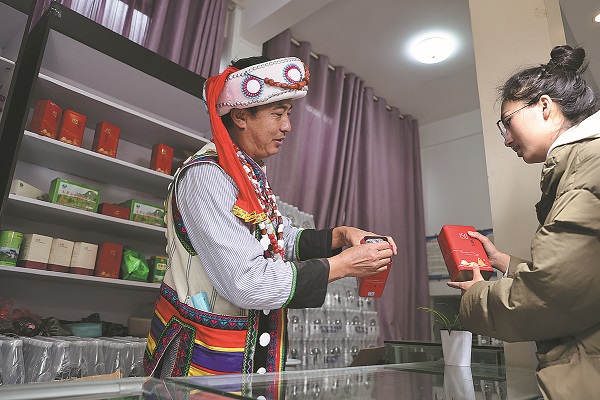Inns help village find a way out of poverty

Yu Wulin (left) receives a tourist at his inn in Laomudeng in Nujiang Lisu autonomous prefecture, Yunnan province. WANG JING/CHINA DIALY
Every night at a village inn in Southwest China's Yunnan province, the owner and local performers lead a group of travelers to sing and dance around a campfire.
It's one facet of a life that the operator, Yu Wulin, had never imagined.
The 47-year-old man, who is also a deputy to the National People's Congress, was a farmer when he was younger, like the majority of the people in the mountainous, once poverty-stricken village of Laomudeng in Nujiang Lisu autonomous prefecture.
Now Yu, a member of the Nu ethnic group, runs two well-known inns with his wife in the village, which is now a famous scenic spot where dozens of other accommodations have been set up by villagers to welcome domestic and even foreign tourists.
"Our people previously didn't have any business sense," he said. "I never expected that I would be the first person to get rich by starting my own business in Laomudeng."
Yu's story began in 1996 when he was selected to participate in an exhibition in Shanghai to showcase Nu culture and traditions. That trip expanded the then-20-year-old's horizons.
At the end of the 1990s, more and more travelers from across the country began visiting Laomudeng. They would hike throughout the day and stay in the village overnight.
Those visitors chose to stay at Yu's home because he was the only person who was able to speak Mandarin in the village back then.
As time passed, more and more travelers opted to stay with Yu and his wife, who cooked authentic Nu cuisine and prepared traditional songs and dances for them, free of charge. People began suggesting to Yu that he start an inn so he could accommodate more visitors. He agreed after consideration.
In 2001, with the help of his relatives and friends, he opened the village's first inn — a tile-roofed house with eight beds — near his home.
Soon, Yu and his wife became more well-known for the service they provided and attracted even more visitors, some of whom even lent money to the couple to help them upgrade and expand the inn twice.
The house with eight beds became two bigger ones with a total of 33 rooms in 2016. After that, the inns collectively earned an average annual revenue of around 450,000 yuan ($64,649) before the COVID-19 epidemic broke out in China.
Travelers have played a key role in the couple's success. Aside from lending money, some have also voluntarily promoted the accommodations and even assisted in the design of the second inn, for which Yu has expressed gratitude.
"Truthfully, it is very hard to run the inns — being busy from morning to night every day," he said. "But, doing this work has allowed me to make a large number of good friends from across the country who have helped me, encouraged me and warmed me. That has made me feel happy."
Yu's success has motivated other villagers to follow in his footsteps. After learning about the business from Yu and his wife, some started their own businesses. Laomudeng now has 33 inns and restaurants, which have attracted more and more guests from various parts of the country.
During the seven-day Spring Festival holiday this year, nearly 10,000 people enjoyed the scenery, food and traditional dance performances in the village. "Our village is getting better, and there are an increasing number of visitors. Most of our villagers have escaped poverty through their tourism businesses," Yu said. "I love my job, so I will stick with it no matter how hard it may be or how tired I am."
- Top legislature schedules standing committee session for late February
- China's top legislator meets with Uruguayan president
- Senior legislator surveys Anhui on formulating outline of provincial 15th Five-Year Plan
- China's top legislator meets with British PM
- NPC deputies see more engagement with top court



